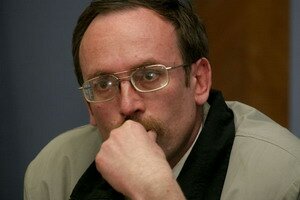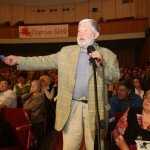
Vyacheslav Sivchyk together with Yury Hadyka were the first Belarusian political prisoner in the post-Soviet times.
He was born on 18 December 1962 in a family of scientists in Minsk. As a child, he spent 10 years with his parents in Abkhazia, after that time the family returned to Belarus. In 1984, Sivchyk graduated from the Geography Faculty at the Belarusian State University. For some time he worked in Abkhazia. In 1988 he returned to live and work in his homeland. He worked in the National Academy of Sciences of Belarus. He dealt with the problems of ecology and the effects of the Chernobyl disaster. In 1989 he became a member of the Belarusian Popular Front.
Chronicle of repression
He was arrested on 26 April 1996, after the Chernobyl path in Minsk. He was charged with organization and active participation in group actions, seriously violating public order. The criminal case against him was launched in the spring of 1996. He was held in the Volodarka prison. To save other members of the BPF Party from being arrested, he began an indefinite hunger strike. At the insistence of the international community and protests on the streets of Minsk, Sivchyk was released after 21 days of detention, On 17 May 1996. But he was banned from leaving the place of residence. The case was completely closed only after a few years.
He was one of the organizers of the closure of the Minsk Francys Skaryna prospect in 1998 and 1999, when Lukashenka and Yeltsin signed an agreement on the creation of a union state. In 2001-2002 he participated in the defense of Kuropaty.
On 11 January 2003, by the decision of the BPF council he was expelled from the party “for destructive activities and for being disobedient to superiors.” Until then, he held various positions in the party, he led the youth wing of the party (in 1998, the Young Front was created under the leadership of Pavel Sieviaryniec).
On the Day of Will – Belarusian Independence Day in 2004, Sivchyk along with three other opposition activists chained themselves to a pole on the October Square in Minsk. In this way, the activists were protesting against the ban on mass celebration of the holiday.
In November 2004, he was a head of the Belarusian branch on the Ukrainian Maidan during the Orange Revolution.
Sivchyk began to create solidarity movement Razam and supported entrepreneurs in the fight for their rights. In March 2006, after the presidential election Sivchyk was one of the organizers of the tent city on the October Square in Minsk (the participants of the four-day action called it Kalinowski Square). Sivchyk was the only representative of the “old” opposition, who spent three days and four nights with the protesting youth. All politicians who were at that time able to take any action, such as Sieviaryniec, Statkevich or Liabedzka were imprisoned by the authorities. A few hours before the pacification of the tent city, about 8.00 p.m. on March 23, the special services kidnapped Sivchyk and kept him up all night, beating him and threatening to shot him.
Sivchyk was transported to the Okrestina prison. He landed up in a hospital, and after four days his friends took him away and hide from the authorities. Vyacheslav Sivchyk left Belarus for Ukraine. In Belarus court sentenced him in absentia to 15 days in jail. He served the sentence after his return from Ukraine in September 2006.
In 2010, after the pacification of the demonstration on the Independence Square in Minsk, Sivchyk again left Belarus. He created and runs the Belarusian center in Ukraine, the aim of which is to organize actions of solidarity with political prisoners and to help political refugees from Belarus.




